
September 24
1884 Birth: Hugo Schmeisser: German weapons designer; one of the most important technical designers of infantry weapons of the 20th century. The well-known German submachine guns of the Second World War, the MP-38 and the MP-40; 1.2 million pieces were manufactured for these weapons, and were among the first weapons to be manufactured with die cast parts, metal stamping, and a complete machine-assembly. This method revolutionized weapon production, allowing manufacture at an unprecedented speed. They became internationally known as "Schmeisser MPs, due to both his role in the production as well as the conspicuous lateral magazine characteristic of his weapons. Hugo Schmeisser's most important work had been underway since 1938. This new automatic weapon, with a short cartridge 7.92 mm, allowed for smart usage of resources and high production. At first named the Mkb 42, it later received the designation of MP-43, and it became one of the first assault rifles. By 1943, 10000 pieces had already been manufactured for the front. For a short time, Hitler stopped production, as he was mysteriously opposed to the new weapon. In 1944, after troop testing verified the new weapon's legitimacy, Hitler authorized mass production of the MP-43 as well as further research into a new MP-44.
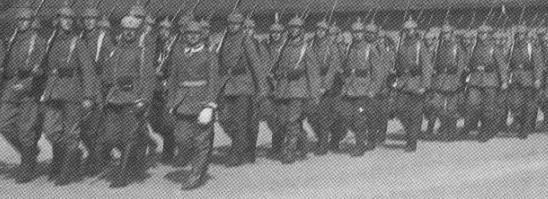
1914 List Regiment (Sep 1-Oct 7): Infantry recruit Adolf Hitler's regiment continues a short but intensive basic training program, which is held in the premises of a large public school on the Elizabeth Platz in Munich. Hitler has received the first uniform of his life; basic greenish-grey with an "RIR 16" sown in red unto the epaulettes and a red stripe down the side of the trousers. The trousers are tucked into new leather boots, topped by a thick leather belt around the waist of the uniform jacket. [For further details, Click here.]
1915 World War I: Grand Duke Nikolai is unceremoniously relieved of command in Poland by the Czar and soon takes command in the Caucasus.

1915 World War I: List Regiment: Gefreiter Adolf Hitler's 16 Reserve Infantry Regiment continues to occupy a position at Fromelles—pictured above in a drawing by Hitler—on a level field with water channels, willow trees and willow stalks; in the distance towards the enemy lines lies an insignificant wood with barbed wire entanglements. Under the direction of their defense-minded commander, Lieutenant General Gustav Scanzoni von Lichtenfels, the regiment works ceaselessly day and night to further fortify their position at Fromelles while fighting off repeated assaults by the enemy. [For further details, Click here.]
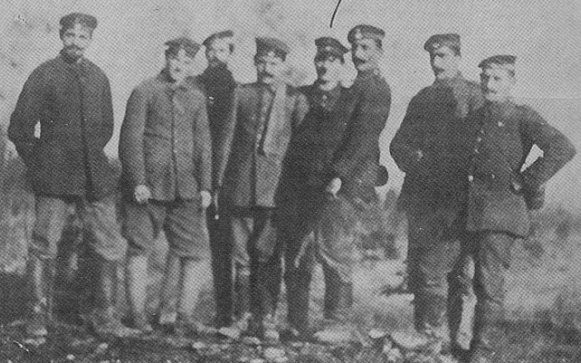
Hitler and his fellow dispatch runners
1916 World War I: List Regiment: (Sep 24-26): Gefreiter Adolf Hitler's 16th RIR is relieved by the 19th Bavarian Infantry Regiment, which is just back from the Somme, and whose men are telling horror stories about the fighting there. The 16th RIR are given a two day rest before being sent off to the Somme themselves. [For further details, Click here.]
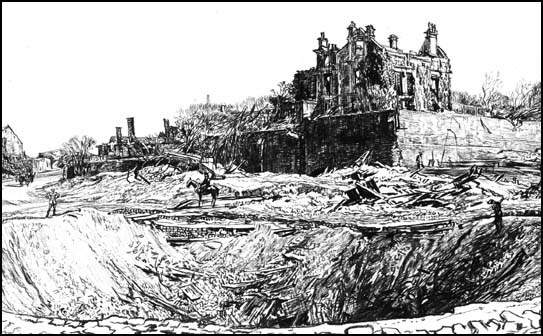
1917 World War I: List Regiment: (September 11-30): The regiment remains on light duty, guarding a camp near Mulhouse in Alsace, the only section of the front on German soil. During this slow time, not only will Hitler and his comrades get a well-deserved respite from the rigors of trench warfare, but the heavily censored news from the Front seems to be improving as well. The news of the collapse of the Russian Front and the further defeats of Italian arms is, however, tempered by the news that German munitions workers have gone on strike. This mix of events give an impression that the war on the Front is going well, but being undermined by defeatism on the home front. [For further details, Click here.]
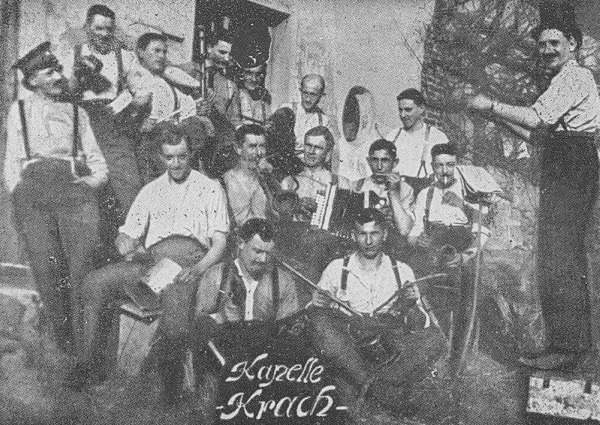
1918 World War I: Various:
List Regiment: (August 21-September 27): Gefreiter Adolf Hitler attends a signals training course in Nuremberg. [For further details, Click here.]
Bulgarian Government Statement Seeking a Ceasefire:
In view of the conjunction of circumstances which have recently arisen, and after the position had been jointly discussed with all competent authorities, the Bulgarian Government, desiring to put an end to the bloodshed, authorised the Commander-in-Chief of the army to propose to the Generalissimo of the armies of the Entente at Salonika a cessation of hostilities and the entering into of negotiations for obtaining an armistice and peace. The members of the Bulgarian delegation left yesterday evening in order to get into touch with the plenipotentiaries of the Entente belligerents.
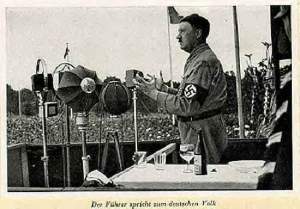
1920 Hitler speaks at the German Nazi Party's first mass meeting—denouncing what he calls the "November Criminals" and calling for "vengeance for the perjured deed of November 9, 1918."
1929 Aviation: The first all-instrument flight takes place in New York when Lieutenant James H. Doolittle guides a Consolidated NY2 Biplane over Mitchell Field. Before the use of instruments, pilots guided themselves using a sophisticated knowledge of astronomy and geography.
1933 Holocaust: Jewish lawyers are banned from the German Bar Congress.
1936 Holocaust: Jewish-owned employment agencies in Germany are ordered to cease operation.
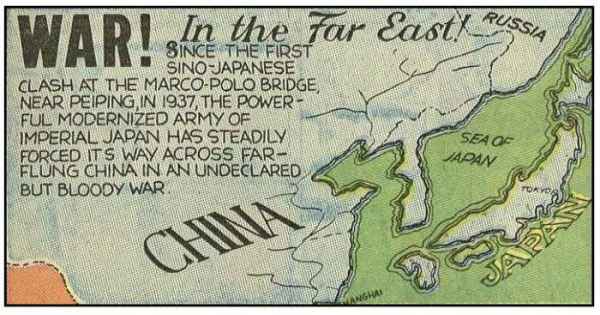
1937: Press Release by President Roosevelt:
Merchant vessels owned by the Government of the United States will not hereafter, until further notice, be permitted to transport to China or Japan any of the arms, ammunition, or implements of war which were listed in the President's proclamation of May 1, 1937. Any other merchant vessels, flying the American flag, which attempt to transport any of the listed articles to China or Japan will, until further notice, do so at their own risk. The question of applying the Neutrality Act remains in status quo, the Government policy remaining on a 24-hour basis.
[See: Countdown to Infamy: Timeline to Pearl Harbor.]1938 France: Anti-Jewish riots break out in Strasbourg.
1939 Various:
Poland:
The Luftwaffe firebombs Warsaw. (THP)
German Special Task Force troops execute 800 Polish intellectuals and leaders in Bydgoszcz. (THP)
Holocaust:
Throughout the Jewish Day of Atonement, Jewish prisoners-of-war are forced to clean the latrines with their bare hands and are treated with particular brutality. (THP)
Synagogues throughout Poland are burned down by Brenn-kommandos, German arson squads. The Germans accuse Jews of setting the fires and impose huge fines on the Jewish communities. (THP)
1940 From the diary of Koichi Kido (Hirohito's Lord Privy Seal and longtime advisor), concerning a meeting in the palace with the Emperor):
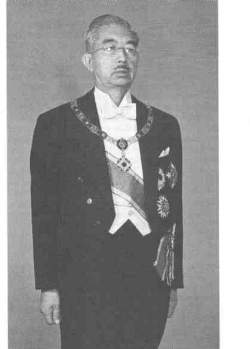
Hirohito
[Hirohito discussed] the Tripartite Alliance and the form the rites should take to commemorate it. The Emperor asked the Imperial Household Minister to consult past records to find out what kind of sacred rituals took place at the time of the signing of the (1904) Anglo-Japanese Friendship Treaty. The Imperial Household Minister had discovered there had been no Shinto religious rites. The Emperor has decided that, dealing with this highly important occurrence . . . . .we should have a special ceremony at the shrine inside the palace, and ask for the blessing of the Gods on his Tripartite Pact.
1941 Various:
Atlantic Charter: Nine allied governments meeting in London pledge allegiance to the Charter, an eight-point declaration issued by FDR and Churchill.
Barbarossa: Heeresgruppe Sued begins an offensive against the vital land bridge to the Crimea at Perekop.
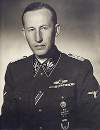
Holocaust: After a conference with Himmler and Reinhardt Heydrich, Hitler names Heydrich as the new Reich Protector of Bohemia-Moravia. (THP)
Japanese gather preliminary data on Pearl Harbor:
On this day in 1941, the Japanese consul in Hawaii is instructed to divide Pearl Harbor into five zones and calculate the number of battleships in each zone, and report the findings back to Japan.
Relations between the United States and Japan had been deteriorating quickly since Japan's occupation of Indo-China and the implicit menacing of the Philippines, an American protectorate. American retaliation included the seizing of all Japanese assets in the States and the closing of the Panama Canal to Japanese shipping. In September 1941, Roosevelt issued a statement, drafted by British Prime Minister Winston Churchill, that threatened war between the United States and Japan should the Japanese encroach any farther on territory in Southeast Asia or the South Pacific.
The Japanese military had long dominated Japanese foreign affairs. So, although official negotiations between the U.S. secretary of state and his Japanese counterpart to ease tensions were ongoing, Hideki Tojo, the minister of war who would soon be prime minister, had no intention of withdrawing from captured territories. He also construed the American "threat" of war as an ultimatum and prepared to deliver the first blow in a Japanese-American confrontation: the bombing of Pearl Harbor.
In September 1941, Nagai Kita, the Japanese consul in Hawaii, was told to begin carving up Pearl Harbor into five distinct zones and to determine the number of warships moored in each zone. Little did Japan know that the United States had intercepted the message; unfortunately, it had to be sent back to Washington for decrypting. Flights east were infrequent, so the message was sent via sea, a more time-consuming process. When it finally arrived at the capital, staff shortages and other priorities further delayed the decryption. When the message was finally unscrambled in mid-October, it was dismissed as being of no great consequence.
It would be found of consequence on December 7. (History.com)
Henceforth, we would like to have you make reports concerning vessels along the following lines insofar as possible.
1. The waters (of Pearl Harbor) are to be divided into five sub-areas. (We have no objection to your abbreviating as much as you like.)
Area A. Waters between Ford Island and the Arsenal.
Area B. Waters adjacent to the Island south and west of Ford Island.
Area C. East Loch.
Area D. Middle Loch.
Area E. West Loch and the communicating water routes.
2. With regard to warships and aircraft carriers, we would like to have your report on those at anchor, (these are not so important) tied up at wharves, buoys and in docks. (Designate types and classes briefly. If possible we would like to have you make mention of the fact when there are two or more vessels alongside the same wharf.) (Costello II)
1942 Various:
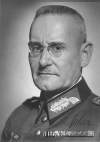
Halder
Colonel-General Franz Halder—Chief of the general staff of the army (OKH), is fired by Hitler and is replaced by General Zeitzler. (THP)
Caucasus: Units of Heeresgruppe A (List) launch an attack against the Black Sea port of Tuapse.
1944 Various:
British naval units begin operations against German-occupied islands in the Aegean Sea in the eastern Mediterranean.
Goebbels claims that Germany will win the war because it is morally superior:
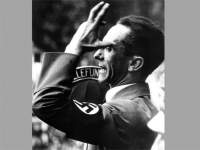
The English and Americans have their military successes in the West only because the greater part of our forces are in the East, and the Soviets are able to roll over the southeast flank only because we must set considerable troop contingents against the Western powers. No one can fail to see that the Kremlin is making the best use of this situation. In the countries it has chosen to be its victims it uses the old Bolshevist practices; that is, it overthrows the national governments that are too weak in character to resist under difficult conditions, disarms their military forces, occupies the critical points of the territory in question, and then lets anarchy run wild in the big cities. Mass meetings with pro-Bolshevist resolutions are followed by street demonstrations. The next stage is so-called popular elections, which happen under the Red Army's bayonets. They always provide the nearly 100% results for Bolshevism that the Kremlin wants. The rest of the road is almost inevitable.
1945 Death: Hans Geiger: German physicist best-known as the co-inventor of the Geiger counter, and for the Geiger-Marsden experiment which discovered the atomic nucleus. He was also a member of the Uranverein (Uranium Club) in Nazi Germany, the group of German physicists who, during World War II, worked on but failed to create the German atomic bomb. (How much this failure resulted from lack of scientific progress and how much from foot-dragging due to ethical concerns remains a lively debate even today.) His loyalty to the Nazi Party led him to betray his Jewish colleagues, many of whom had helped him in his research before he became a member of the Nazi Party.
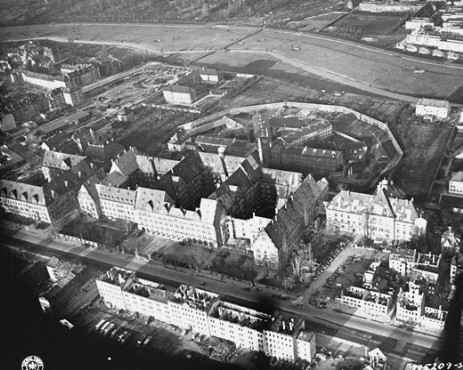
1946 Nuremberg Tribunal: The justices continue to discuss verdicts in the Major War Criminals Trial. (See: 30 September 1946)
1948 Mildred Gillars—known as "Axis Sally"—pleads Not Guilty to charges of treason.
1953: Cold War: United States will not "cringe" before Soviet weapons:
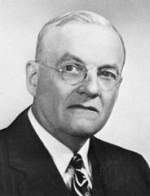
In a speech that is by turns confrontational and sarcastic, Secretary of State John Foster Dulles declares that the United States will not "cringe or become panicky" in the face of Soviet nuclear weapons. Dulles' speech indicated that although the Korean War had finally reached a peaceful conclusion, the United States would continue its policy of containing communist expansion, by force if necessary.
Secretary Dulles began his speech to the American Federation of Labor by observing that he believed world peace was within reach, but was threatened by "communist leaders who openly repudiate the restraints of moral law." The United States, he declared, "does not believe that salvation can be won merely by making concessions which enhance the power and increase the arrogance of those who have already extended their rule over one-third of the human race." Acknowledging that the Soviets now possessed a nuclear arsenal, Dulles countered that the United States would not "cringe or became panicky." Turning to the issue of labor, Dulles then spoke at length about what he called the communist "swindle." The secretary spoke derisively of the "hoax" played on Russian workers by their own government. "The Russian worker," Dulles stated, "is the most underpaid, overworked person in any modern industrial state. He is the most managed, checked, spied on, and unrepresented worker in the world today."
Dulles' speech indicated that although the new administration of President Dwight D. Eisenhower had recently finished negotiating a cease-fire in Korea, the United States was not backing off from its stated Cold War commitment to containing communism. The speech also hinted at two points that would become mainstays of the Secretary's Cold War diplomacy. First was the idea that the United States would not back down from the Soviets simply because of the threat of nuclear war. This idea eventually became known as "brinkmanship, the notion that the Soviets, if pushed to the "brink" of nuclear war, would eventually back down. Second was Dulles' frequently repeated assertion that the people living in communist nations were essentially "captives" of repressive communist regimes. In the years to come, Dulles would expand on both ideas in more detail.(History.com)
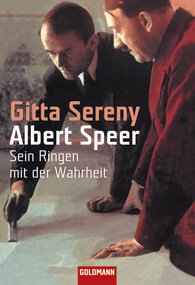
1996 Award-winning author, Gitta Sereny, is interviewed by Marilyn Powell about Albert Speer:
It was many years afterwards that Speer approached me; I did not approach Speer. I'd read his two books, Inside the Third Reich and Spandau: The Secret Diaries. I was impressed by them. But I'd seen him on TV, and I decided, "Well, too many people are seeing him, I don't want to see him." By that time, I had a certain--you know, I was a bit known in England as a journalist, and I could have done a story on him, but I didn't want to. And then in 77, I got this letter from him after I did, with Lewis Chester from The Sunday Times, this expose of David Irving, the revisionist writer in England, who had written this book, Hitler's War, in which he claimed that Hitler had not known about the extermination of the Jews until October 43. Well, I mean this was just so absurd. And Speer wrote to me, and said that he had considered David Irving extremely dangerous. Well, then, he said, if ever I was near Heidelberg, would I like to come and see him? Well, I fought this, you know, for four months. And he kept pursuing me by telephone. And finally after four months of telephone calls from Speer and letters and books he sent me and articles which might interest me and so on and so forth, well, I said, "It's ridiculous, I'll go." I mean, you know.
Edited by Levi Bookin (Copy editor)
levi.bookin@gmail.com



Click to join 3rdReichStudies



Disclaimer: This site includes diverse and controversial materials--such as excerpts from the writings of racists and anti-Semites--so that its readers can learn the nature and extent of hate and anti-Semitic discourse. It is our sincere belief that only the informed citizen can prevail over the ignorance of Racialist "thought." Far from approving these writings, this site condemns racism in all of its forms and manifestations.
Fair Use Notice: This site may contain copyrighted material the use of which has not always been specifically authorized by the copyright owner. We are making such material available in our efforts to advance understanding of historical, political, human rights, economic, democracy, scientific, environmental, and social justice issues, etc. We believe this constitutes a "fair use" of any such copyrighted material as provided for in section 107 of the US Copyright Law. In accordance with Title 17 U.S.C. Section 107, the material on this site is distributed without profit to those who have expressed a prior interest in receiving the included information for research and educational purposes. If you wish to use copyrighted material from this site for purposes of your own that go beyond 'fair use', you must obtain permission from the copyright owner.
Please Note: The list-owner and moderators of 3rdReichStudies are not responsible for, and do not necessarily approve of, the random ads placed on our pages by our web server. They are, unfortunately, the price one pays for a 'free' website.